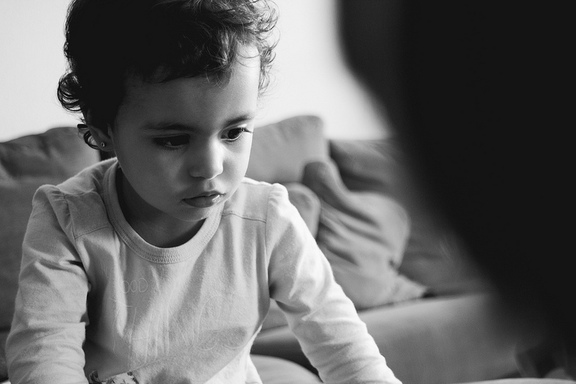0 Comments
I often write for KSL on topics such as infertility, parenting or general mental health. This article was originally published by KSL, and I hope you find it useful.
How many times have you heard if you just … “go on vacation, lift your legs above your head, adopt, relax — you’ll get pregnant.” Those suggestions are hard enough to get out of your head, but how do you know when you’re ready to get off the treatment merry-go-round and move to third-party reproduction, change paths to adoption, or live child free? Ending treatment can feel like giving up. You hear things like, “But my sister’s roommate's cousin got pregnant after her 6th IUI.” It’s just right around the corner, right? You’ve likely invested a significant amount of money and emotional energy into building your family. It dominates your thoughts and it feels awkward to turn the other direction. If you choose to end treatment and move toward adoption, you may feel that you are betraying the imagined biological child in your mind. Just because there are lots of options doesn’t mean you have to take them. If you are considering ending treatment, you might notice an uptick in anxiety. This is normal. Spend time noticing the feelings that are coming up for you. Consider journaling or talking them through with someone you trust. Allow for feelings of disappointment and regret as well as feelings of hope. Take time out to decide For some, taking a break will help in making a sound decision. For others, taking a break just means that time is ticking away. Consider giving yourself a window of time, agree that you will set aside a month to explore your feelings about a family building path. When the time is up, reassess your thoughts and feelings. Evaluate Consider how much infertility treatment has impacted you to this point. This is important. Think in terms of physically, financially, emotionally, spiritually. Does the idea of another round of IVF turn your stomach? Is your partner burned out? How is your support system — can you continue to rely on them if treatment proceeds? What is it you really want? Accurately articulate your wishes regarding parenthood. Is pregnancy required to be part of your experience? For example, when you send out your wish for the future, is it “I want to be pregnant” or is it “I want to be a mother?” Many women feel very strongly about experiencing pregnancy; others, as treatment progresses, feel that their priority is parenting a child and therefore pursue other options of family building. Undoubtedly, this also changes as you move through infertility treatment. If you are considering stopping treatment, this is a good time to reassess your thoughts and feelings about how to build your family. Take control You and your partner are responsible for choosing when to stop. A physician can provide recommendations, and probability of success. It is up to you to decide how to use this information. It’s common for couples to feel compelled to keep moving along the treatment track, and this is often successful. But, each step of the way, keep in mind you are in charge of making the decisions. Infertility offers little in the way of feeling in control. But by making decisions about what testing or treatment to pursue, you can regain this control. Importance of ritual Ritual is an important part of healing. All cultures throughout history have understood this. When someone marries, has a birthday, dies, we mark the occasion with a variety of traditions. Part of what makes infertility so isolating is that it lacks ritual. When someone miscarries, there isn’t a way, within our larger culture, to mark this loss. Similarly, when a couple decides to stop treatment (which inevitably means not having a biological child), there isn’t a way to recognize what a shift this is. If you decide to end treatment, you may consider marking this decision in your own way. Maybe this means ceremonially getting rid of all the paperwork, ovulation predictor kits, pregnancy tests that accompanied you through treatment. Perhaps this means writing a letter to the biological child you’ve always had in your mind. Maybe this means announcing to the world your joy at pursuing adoption. Do what feels good for you. Deciding when enough is enough is not an easy decision. It can often be more difficult to decide to stop treatment than it was to start treatment. Be kind to yourself during this transition, and give yourself the time and attention needed to feel at peace. The first day of school is upon us, and many children are returning to school or starting their first day of kindergarten. This is a stressful time for children (and parents). Separation anxiety is common in school-age children. It is characterized by persistent or excessive worry about separating from a child’s primary caregiver. This translates into the dreaded emotional drop-off, a child who won’t get out of the car, they are pulled, tearful, into the school building only to scream as their parent walks away. We’ve seen it or we’ve been “that parent” only to return to our car and have our turn at crying. Not fun for anyone.
Even if your child isn’t excessively worried about going off to school, some of these techniques can ease the transition.
Lastly, be aware of your own feelings. Are you as scared about your child leaving you as he is? Your child may be picking up on this, and reacting to it. Try and talk through these feelings with another adult (not your child) so that you can be emotionally available to your child. If your child is struggling to transition into school, know that it’s normal and for most children is resolved in the first few weeks. Sometimes I can hear it in a parent’s voice when they first call to make an appointment, the trepidation, the guilt, the anger. “My kids is out of control.” They may describe a child being suspended from school or day care, or being tearful all the time. Often times the root of these concerns comes down to emotional regulation.
Emotional Regulation is a skill that isn’t innate, we learn it, we watch those around us for cues on how to do it. It takes practice, just like anything else. Generally we get better at it as we age. Think of a newborn, the response to pain, sadness, unmet needs is all the same, crying--it’s the only form of communication they know so far, and it’s highly effective. As children age they develop more sophisticated ways of managing strong emotions. In play therapy I see it as one of my primary goals to teach children feelings identification and expression. I use role plays, sand tray, puppets and games to accomplish this. A child who acts aggressively or loses control and throws crying fits are still trying to fine tune how to express “big feelings.” I often see this in the school setting, teachers are frustrated with children who act out, and typically these same children struggle with social connections because their emotions are so unpredictable. If you are nodding your head, thinking, that’s my boy! You are not alone. This is a very common concern parents report during our first visit. Parents tend to feel instant relief just reframing this concern into a need for skills, rather than just “bad behavior.” As I stated, emotional regulation is learned. I suggest that parents begin with this one subtle intervention. - Label emotions for your child For example, your daughter sulks away to her room and avoids everyone in the house, she begins crying and kicking the wall. You might say “You seem like you might be sad about something?” This not only validates her feelings and shows that you are noticing, but it may put a word to a complex emotion she is feeling. This is a starting point for regulation emotion, connecting the feeling inside your body (lump in throat, tears, weight on your chest) to the emotion. As adults, we forget how difficult it can be to navigate life as a child when “big emotions” do come up. Typically, by the time we are adults we’ve accrued quite a toolbox of things to do when we are upset or overwhelmed. Children are just building this tool box. When they are faced with events in life that stir up an emotional response (whether that’s something as simple as not liking what’s for dinner, or the death of a parent) they are using the tools they have so far. Life tends to constantly feed us experiences where we learn more effective ways to cope, kids are on that road too. As a child therapist it’s my job to join them and provide some hands on ways to improve these skills.
If I know one thing about us humans, it's that we are all seeking connections. Kids, adults and everyone in between at their very essence want to be seen, heard and understood. The following is a short that points out the importance of empathy and it's role in relationships. Brene Brown, who refers to herself as a "researcher and storyteller" is an expert in this area. The following is a collaboration between herself and RSA shorts on the topic of empathy. She typically writes on topics such a shame and vulnerability, if this resonates with you, you can find out more about Brene Brown at www.brenebrown.com Infertility and Father's Day--typically not a holiday many of us look forward to who are dealing with the difficulty in building a family. KSL recently featured an article I wrote on this very topic. Read on....
SALT LAKE CITY — First, a few caveats: I am not a father, or a male. Despite this, I am married to a man, and together we survived many a childless Father’s Day. Additionally, I work as a therapist with couples experiencing infertility. Therefore, I will do my best to shed some light on infertility experienced by men via my perspective. I have found, both personally and working with couples through my practice, that infertility grabs at the very essence of a relationship and tears away your future plans. Undoubtedly men experience all the same feelings anyone dealing with infertility does — inability to plan one's future, difficult decisions about family building, financial strain, feelings of loss, watching friends/family experience parenthood, anger, and even shame. But just as women experience infertility layered in our inevitable cultural expectations, men have their own version. They are not limited to: “be confident, be strong, don’t cry, be interested in a family, but don’t show emotion if it doesn’t happen.” Even for men who don’t ascribe to these values, the undercurrent of these messages in our society is palpable. Couples are keenly aware of the subtle stigma related to being unable to reproduce. It seems men often feel “less of a man” if the couple experiences male-factor infertility. This feeling is not exclusive to men. If infertility problems aren’t spread evenly between the couple, one person undoubtedly feels “it’s my fault.” That fault can feel heavy for men who perceive that they are standing in the way of their wife’s dream. Men may feel helpless, their inability to “fix” this problem of infertility somehow chipping away at their confidence. The shame they may feel often translates to “something is wrong with you.” The factor I see most commonly in men is the desire to support their wives rather than being able to show the very real grief and loss they too are experiencing. Not to mention the awkwardness of providing a sperm sample, then hearing the results. Men may experience a shift in their sex life with their partner. For example, being intimate “because it’s time.” Men and women are often on different timelines in their family building plans. It seems men sometimes take a slower, conservative approach and may feel pressure from their wife to proceed with testing/treatment/adoption. But the factor I see most commonly in men is the desire to support their wives rather than being able to show the very real grief and loss they are too experiencing. This is a shame, because although there are certainly some feelings inherent to experiencing infertility as a man, many of the core beliefs and experiences are shared between couples. Because who doesn’t need a companion (or two) while riding the roller coaster of infertility? Whitney Barrell, MSW, LCSW, holds a master's degree in social work from the University of Utah. She is an "infertility survivor" and enjoys working with couples experiencing infertility. Find out more: www.whitneybarrellcounseling.com. Emotional Aspects of Infertility
A subject near and dear to my heart, infertility. Some of the most important work I do is with women and couples around infertility. The following article is from Resolve, the National Infertility Association. If you aren't familiar with their work , skip over to their website here. They are an excellent resource for information on treatment, testing, support group (on-line and in person), books on family building. They also have an active advocacy group who work with congress to extend the adoption tax credit and work towards infertility treatment being cover by insurance. One of the most challenging aspects of the infertility experience is dealing with the emotional ups and downs relating to medical treatment, the uncertainty about outcomes, and the challenge of having to make important decisions such as when 'enough is enough.' It is important to learn how to take care of yourself, make sure you that get the support you need, and to manage your emotions so that your self-esteem and outlook on life remains as positive as possible. Loss What does a couple who has just been diagnosed with a fertility problem have in common with a couple who just had their fourth miscarriage? The level of anguish may not be the same, but these two couples do have a lot in common: a sense of loss and disappointment, and the feeling of emotions and events being out of control. For both couples a basic assumption-that by being decent people who try hard in life, your wishes will be fulfilled-has been shattered. Symptoms Even if your mind isn't consciously thinking about loss, your unconscious mind and your body may be responding to feelings of grief. Do you recognize any of the following symptoms that either appeared or worsened during your infertility experience:
Denial, Shock and Numbness After several months of unsuccessful attempts to get pregnant or stay pregnant, feelings of shock or numbness may result. Feelings of "this can't be happening to us" or "I know next month we will be successful" begin to change over to anger and guilt. Anger Anger usually results from feeling vulnerable or helpless or both. Helpless feelings result from the lack of control that you may feel over your life plan, your body, and your future. This may be a new experience; previously, when you worked hard at something, you probably achieved your goal. Now you are working hard and doing everything you can to conceive, but without reaching your desired goal. A sense of vulnerability evolves from feeling "jinxed," or feeling that life isn't fair. You may feel as if you can no longer count on anything good happening in your life. Anger can consume you, coloring your everyday thoughts and experiences. You may feel emotionally guarded, pulled between tears and sadness or anger and rage. The next time you feel angry, irritable, or frustrated, take an inventory of your body and identify how different parts of your body respond to the angry feelings. Do your legs feel weak? Does your heart beat faster? Do you feel flushed or shaky? Does your breathing change? Become familiar with how you react physically to these intense emotions. Remember that anger is a normal response to infertility. You may find it helpful to try some of these techniques to manage angry feelings. There is no "right" way to do this; don't force it, and don't expect a specific response. Tears and feelings of sadness often mingle with anger.
Shame is a searing, painful feeling associated with faltering self-esteem, and a sense of inadequacy, defectiveness and helplessness. As repeated attempts to get pregnant come to naught, there is a realization that this intensely strived-for goal has not been, and may never be, attained. As this failure becomes more and more evident, one's self-image is assaulted. It is easy to move from procedures that have failed to the feeling that "I am a failure." Anguish, self-doubt, and chronic sadness converge as couples come to think of themselves as failing, not only in realizing their own dream to reproduce and nurture, but failing their spouse, parents, and siblings as well. Because shame embodies the painful sense of self-defect, it is often hidden and disguised, even from oneself. The tragic story of chronic infertility is that, over a period of time, the sense of failure gradually and imperceptibly spreads like a shadow over a person's experience, while simultaneously the sense of other competencies gradually become obscured. Ultimately what heals is the acceptance of the self with all of its weaknesses and failures. The goal, then, is to reach a point where you can accept what you see as failure and no longer have to conceal these feelings of shame. The process of coming to terms with infertility is long and gradual, but it is possible to transform the sense of failure into an empathy with yourself, an affirmation of your strength, an acceptance of your limits, a pride in your endurance, and maybe most of all, an empathy with others who, as partners in the human condition, also face defeats. In time, the shadow cast upon your life can fade and the light can shine through again. Hello, I'd like to share a short video on one of my favorite topics. The intersection between neuroscience, therapy and parenting. It features two highly regarded researchers and professionals in this field, Dr. Bruce Perry and Dr. Daniel Siegel. These findings help guide my treatment planning with children who have experienced trauma. Enjoy! Good Day, Welcome KSL readers! Today KSL has published an article in which I outline the common reasons that parents bring their children to therapy. I also attempt to decrease some of the stigma related to child mental health. Head here to read it! Or, I've also provided it below. Could my child benefit from therapy?
For the majority of children, the answer is no, but if you are wondering, read on. As parents, our primary goal is to nurture and protect our children. When we consider that our child may benefit from mental health intervention many of us feel overwhelmed, guilty or ashamed. But this need not be the case. Life happens, and it happens to children too. Therapy is a safe place to explore difficult events from the past or learn new life skills. Play therapy has some similarities and some differences from traditional talk therapy. For example, we know that children make sense of the world through play. Additionally, their cognitive mechanisms are not fully developed yet and therefore focusing interventions purely based on talking and the use of language is less effective. We use play to bridge this gap. When we consider that our child may benefit from mental health intervention many of us feel overwhelmed, guilty or ashamed. But this need not be the case. Life happens, and it happens to children too. Play therapy relies on parents' input and cooperation. You know your child better than anyone else. You have the relationship and opportunity to best assist your child. Consider the therapist as a coach who provides instruction on things to do at home. Many parents wonder if their child may benefit from therapy. There are several common reasons parents bring their children to be seen.
Lastly, children are resilient. Early identification and treatment will prevent the loss of critical developmental years. Researcher Emmy Werner has identified children that are “active, affectionate and good-natured” are better able to cope with stressful life situations. Providing your child with the tools needed to work through this sometimes unpredictable world will benefit them for years to come. Whitney Barrell, LCSW, has a master's of social work from the University of Utah. In her private practice she enjoys working with children and families on myriad mental health issues. She can be reached atwww.whitneybarrellcounseling.com. |
Archives
March 2024
Categories
All
|




 RSS Feed
RSS Feed